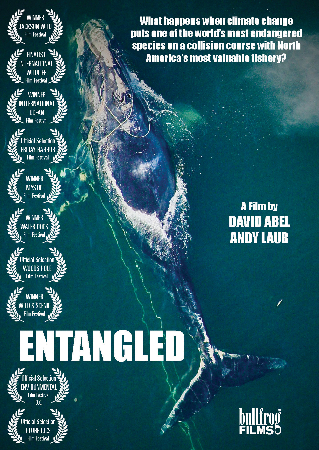
Entangled 2021
Distributed by Bullfrog Films, PO Box 149, Oley, PA 19547; 800-543-FROG (3764)
Produced by David Abel, Andy Laub, and Lise King
Directed by David Abel
Streaming, 75 mins
College - General Adult
Environmentalism; Marine Sciences; Wildlife Conservation
Date Entered: 07/14/2021
Reviewed by Angela Walker, Reference & Instruction Librarian, Eastern Connecticut State UniversityWhat we learn: We have managed to reduce the North Atlantic Right Whale population from around 20,000 in pre-whaling times to less than 300 today. Despite the Marine Mammal Protection Act of 1948 it is threatened to go extinct. According to the National Oceanic and Atmospheric Administration (NOAA), entanglement in fishing gear and vessel strikes are the leading causes of its mortality. Unlike with climate change – another factor degrading the whale habitat with shifting feeding grounds - fisheries can make changes of immediate impact by reducing the number of lobster buoy lines responsible for fatal whale injuries. The required change means reduced income for the lobster industry, a fishery already threatened by climate change related lobster migration along the New England coast.
David Abel’s film, Entangled, is an excellent documentary of this collision of interests and how society deals with this dilemma. The film lets us witness the discussions and negotiations between antagonistic groups, and it highlights the ongoing activities to raise awareness and political engagement about this problem. Saving the whales from extinction requires immediate action. By alternating coverage of the opposing voices, presenting scientific findings, and showing marine scientists and environmental activists at work, Abel demonstrates very well how politics get in the way of developing consensus on human action. The federal agency NOAA serves as an example of split interests with its mandate to manage productive fisheries as well as the conservation of protected species. Seeing people of both sides coming to the table to work on solutions and compromises provides an important learning opportunity. The strength of the film lies in the documentation of all grievances related to the issue. We gain empathy for lobstermen who are distraught over the potential loss of their livelihood and family traditions, instead of seeing them only as opponents to the necessary change. As the film switches back and forth between the different voices, the audience gets the complete picture and is thus well informed and encouraged to support the cause and develop creative solutions.
Documenting the efforts of a lobster fisherman who wants to coexist with the whales, as well as showing someone at work on an invention to eliminate lobster buoy lines all together, are highly effective parts of the film to keep the viewer hopeful and engaged, as this builds a bridge to workable solutions instead of ending in a standoff. Showing all perspectives on the issue and explaining the hurdles in activism creates a valuable balance and makes this documentary an excellent educational resource. Apart from the very informative content, this documentary is also superbly filmed with extraordinary scenes on the ocean where we can witness close-up the preventable suffering of these endangered whales.
Entangled is well-suited for courses in environmental studies, political science, biology, economics, and other disciplines that want to explore responsible and sustainable stewardship of the planet. The film provides an excellent example of human efforts to collaborate on environmental solutions that are vital to all of us. As one young activist in the film puts it: “We wouldn’t like it if we went extinct, so why make other animals extinct?”
Awards:
Best Non-Broadcast Film, Jackson Wild Media Awards; Best Feature Film, International Wildlife Film Festival; John de Graaf Environmental Filmmaking Award, Wild & Scenic Film Festival; Best Conservation Film, International Ocean Film Festival; Best Wildlife Film, Livable Planet Film Festival; Best Conservation Film, Mystic Film Festival; Best Feature Film, Water Docs Film Festival
Published and licensed under the Creative Commons Attribution 4.0 license. Anyone can use these reviews, so long as they comply with the terms of the license.